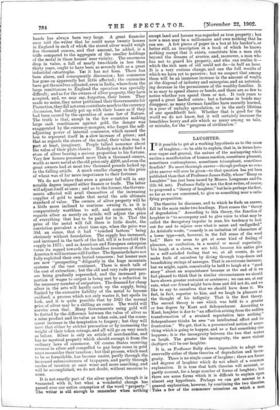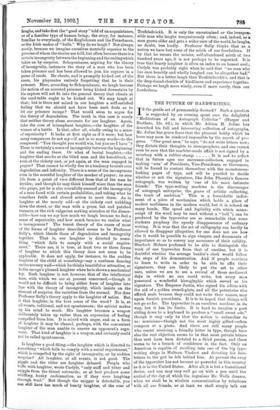LAUGHTER.
IS it possible to get at a working hypothesis as to the cause of laughter,—to be able to explain, that is, in terms how. ever vague and general, the nature of the mainspring which excites a manifestation of human emotion, sometimes pleasant, sometimes contemptuous, sometimes triumphant, sometimes fiendish? No more thorough answer—though perhaps no com. plete answer will ever be given—to that question has yet been published than that of Professor James Sully, whose "Essay on Laughter" has just been issued by Messrs. Longmans and Co. (12s. 6d. net). Professor Sully is not the first writer, of course, to propound a " theory of laughter," but he is perhaps the first, so far as we are concerned, to give us something near a satis. fying proposition.
The theories he discusses, and to which he finds an answer, fall in the main under two headings. First comes the " theory of degradation." According to this theory, the function of laughter is " to accompany and to give voice to what may be called the derogatory impulse in man, his tendency to look out for and to rejoice over what is mean and undignified." As Aristotle wrote, " comedy is an imitation (of characters of a lower type—not, however', in the full sense of the word bad." Here we seem to get at some kind of feeling of pleasure, or exultation, in a mental or moral superiority. We laugh at a clown, we are told, because his antics give us a self-satisfied feeling that we, at all events, do not make fools of ourselves by diving through trap-doors and brandishing strings of sausages. That is an extreme instance; but we might, again, conceivably be held to laugh at a " good story" about an acquaintance because at the end of it we feel pleased to think that in similar circumstances we should have shown greater restraint or acuteness ; we can see, at any rate, what our friend might have done and did not do, and we like to say to ourselves that we should have done it. We feel, in fact, superior to him, and we laugh in pleasure at the thought of his indignity. That is the first theory. The second theory is one which was held to a greater or less degree by Kant and Schopenhauer. According to Kant, laughter is due to "an affection arising from the sudden transformation of a strained expectation into nothing." Schopenhauer thinks he sees "an intellectual effort and its frustration." We get, that is, a preconceived notion of some- thing which is going to happen, and as a fact something else happens ; it is the incongruity between the two that makes us laugh. The greater the incongruity, the more violent (lieftiger) will be our laughter.
It is, as Professor Sully shows, impossible to adopt un- reservedly either of these theories of degradation and incon- gruity. There is no single cause of laughter; there are forms and degrees of laughter which do not admit of a common explanation. It is true that both theories will account, or partly account, for a large number of forms of laughter; but there are some forms which it is difficult to explain upon almost any hypothesis. Perhaps we can get nearest to a general explanation, however, by combining the two theories. Take a few of the commoner occasions on which a man laughs, and take first the " good story" told of an acquaintance, or of a familiar type of human being; the story, for instance, familiar to everybody, of the Englishman and the Frenchman, or the Irish maker of "bulls." Why do we laugh ? Not always, surely, because we imagine ourselves mentally superior to the persons of whom the stories are told, but often because there is a certain incongruity between the beginning and the ending which takes us by surprise. Schopenhauer, arguing for the theory of incongruity, instances the story of a man who has been taken prisoner and has been allowed to join his captors in a game of cards. He cheats, and is promptly kicked out of the room, his playmates entirely forgetting that he is their prisoner. Here, according to Schopenhauer, we laugh because the notion of an arrested prisoner being kicked downstairs by his captors will not fit into the general theory that cheats at the card-table ought to be kicked out. We may laugh at that; but is there not mixed in our laughter a self-satisfied feeling that we should not have been such fools as to let our prisoner escape ? That would seem to argue for the theory of degradation. The truth in this case is surely that neither theory alone accounts for our laughter. Again, take the case of triumphant laughter,—the laughter of the winner of a battle. Is that, after all, wholly owing to a sense of superiority ? It looks at first sight as if it were; but how many conquerors do not say—if not in so many words—to the conquered : "You thought you would win, but you see I have"? There is certainly a sense of incongruity between the beginning and the ending there. Or what of brutal laughter,—the laughter that mocks at the blind man and the hunchback, or even at the rickety cart, or yet again, at the man engaged in prayer? That cannot be wholly due to a tendency to exult over degradation and infirmity. There is a sense of the incongruous even in the scornful laughter of the mocker of prayer; he sees life from a point of view different from that of the man he derides ; and though he may think himself wiser than the man who prays, yet he is also scornfully amused at the incongruity of a man faced with certain probabilities, and taking what he considers futile and absurd action to meet them. As to laughter at the merely odd—at the rickety cart wobbling down the street, or the man with a green, hat and patched trousers, or the rich vulgarian making mistakes at the dinner. table—how can we say how much we laugh because we feel a sense of superiority, and how much because we realise what is incongruous ? The truest theory of the cause of most of the forms of laughter described seems to be Professor Sully's, which blends those of degradation and incongruity together. That is, our laughter is directed to some- thing "which fails to comply with a social require- ment." There are, it is true, at least two or three forms of laughter to which this theory does not seem to be applicable. It does not apply, for instance, to the sudden laughter of the child at something—say a sunbeam dancing on the nursery wall—which he thinks beautiful or attractive, or to the savage's pleased laughter when he is shown a mechanical toy. Such laughter is not, however, that of the intellectual man, with which we are at present concerned,—though it would not be difficult to bring either form of laughter into line with the theory of incongruity, which insists on the element of surprise, the variation from the normal. Nor does Professor Sully's theory apply to the laughter of satire. But is that laughter, in the true sense of the word ? It is, at all events, volitional, and not spontaneous; the satirist makes up his mind to mock. His laughter becomes a weapon deliberately taken up rather than an expression of feeling compelled from him. It is mixed with anger, and as a form of laughter it may be classed, perhaps, with the convenient laughter of the man unable to answer an opponent's argu- ment. That kind of laughter is a weapon, and certainly could not be called spontaneous.
Is laughter a good thing,—the laughter which is directed to something "which fails to comply with a social requirement," which is compelled by the sight of incongruity, or by sudden surprise? All laughter, at all events, is not good. The giggle and the titter are laughter debased. People who trifle with laughter, wrote Carlyle, "only sniff and titter and sniggle from the throat outwards; or at best produce some whiffling, husky cachinnation, as if they were laughing through wool." But though the snigger is detestable, you can still have too much of hearty laughter, of the roar of
Tenfeladrockh. It is only the unrestrained or the irrespon- sible man who laughs tempestuously often ; and, indeed, as a man grows older and gets a wider view of the world, he laughs, no doubt, less loudly. Professor Sully thinks that as a nation we have lost some of the mirth of our forefathers. If by that he means the noisier, self-abandoned mirth of two hundred years ago, it is not perhaps to be regretted. It is true that hearty laughter is often an index to an honest soul ; Carlyle was probably right when he said that "no man who has once heartily and wholly laughed can be altogether bad." But there is a better laugh than Teufelsdrocklis, and that is the deep-found chuckle of kindliness and experience together. Perhaps we laugh more wisely, even if more rarely, than our forefathers.











































 Previous page
Previous page